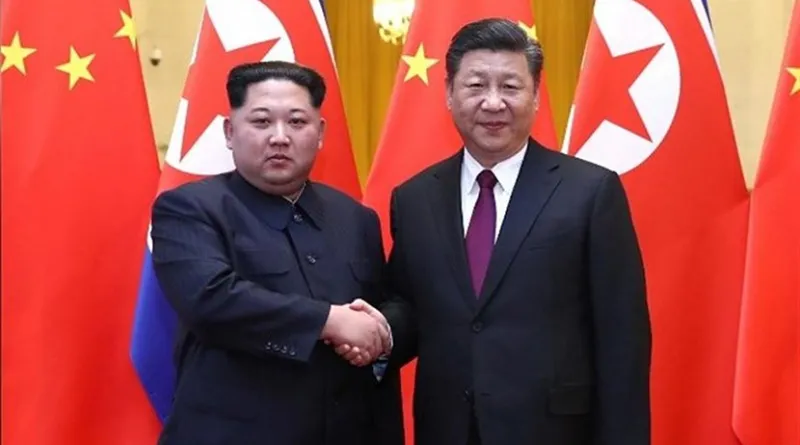Chinese Aid Strategy Hinders Goals On North Korea – Analysis

The 2018–2021 period can be seen as an important turning point in Korean history. In the space of a few years, the US–China confrontation has changed everything in Northeast Asia — and this change is likely to last for a long time. The ‘new Cold War’, as this confrontation is sometimes known, has not altered China’s strategic goals in Northeast Asia. But China is now willing to invest much more to achieve them.
What are these goals?
First, China needs a stable Korean peninsula. China does not want to deal with a Syria-style mess nearby — especially one involving large stockpiles of nuclear weapons and other weapons of mass destruction.
Second, China wants Korea to remain divided. Currently, Korean unification is synonymous with the absorption of the destitute North by the rich South. For China, this would amount to a democratic and fiercely nationalistic state emerging on its border. This new state would most likely be an ally of the United States, with potential for US troops to be stationed on its soil unless withdrawal were part of a grand settlement.
China’s third goal is the denuclearisation of the Korean peninsula. The North Korean nuclear program undermines the non-proliferation regime, which gives massive advantages to the ‘nuclear five’, including China.
The first and second goals, while not the same, both involve maintaining the status quo. This is especially pronounced as China enters a long-term confrontation with the United States.
The first Cold War lasted for four decades. Nobody knows how long the ‘second Cold War’ will continue. There may be ups and downs, periods of detente and of crisis. But no signs of a solution or lasting compromise are in sight.
Until a few years ago, China was remarkably ambivalent about the future of North Korea. As recently as late 2017, Chinese diplomats not only supported the ultra-tough US sanctions on North Korea in the United Nations, but also pressed Russia, their junior ally, to vote in favour of these sanctions.
These are positions of the past. While China does not violate the United Nations Security Council (UNSC) sanctions blatantly, it is willing to turn a blind eye to small-scale violations, use all available loopholes to support North Korea and sometimes ship forbidden items to the state — if the chances of being caught are low.
Even now, when North Korea, wary of the impact of COVID–19, has cut itself off from the outside world, Chinese aid keeps coming quietly. While the provisions of food aid are not in violation of UNSC resolutions, shipments of fuel are. Reports that North Korea is working hard to build disinfection and quarantine centres to process Chinese aid suggest much larger volumes are expected.
Despite its dislike of North Korea’s nuclear program and generally critical attitude to the Kim Jong-un regime, China has no choice but to keep North Korea afloat. North Korea’s stability is a paramount concern to Beijing and this is likely to remain the case in the foreseeable future.
From the international community’s point of view, this is both good and bad.
The Chinese decision to keep North Korea afloat means that the North Korean government can rely on ‘dole payments’ from China. These welfare cheques will not bring industrial growth to North Korea but will ensure against a major outbreak of famine. As long as the North Korean people receive enough to survive and officials are reasonably rewarded for loyal service, North Korea is likely to remain stable.
Chinese aid also means that Pyongyang has fewer reasons to worry about its outdated and inefficient economic system. The first years of Kim Jong-un’s rule were marked by quiet but radical economic reforms which largely emulated what China did in the 1980s, albeit without any attempts at political openness. Since 2018 these reforms have been increasingly obstructed and rolled back. More economic freedom can be dangerous for domestic stability as it allows North Koreans to be less dependent on the government.
Improvements in the China–North Korea relationship have tempered North Korea’s penchant for nuclear warnings. Unlike his predecessors, US President Joe Biden was not welcomed into office by North Korean nuclear tests and intercontinental ballistic missile launches. China’s unhappiness about North Korean provocations, which attract unnecessary attention to the region and justify the US military presence there, has persuaded North Korea to keep quiet.
North Korean society will be even more closed and controlled than before. The economy will remain inefficient, but if it can count on regular shipments of Chinese aid it is unlikely to become politically dangerous. As long as Chinese dole payments continue arriving, North Korea will find itself in a time warp — for years or even decades.
But North Korea’s nuclear weapons are here to stay. China’s leverage is not strong enough to push North Korea into denuclearisation. In Beijing’s view, denuclearisation takes a back seat to the maintenance of stability on the peninsula. A meaningful compromise that reduces North Korea’s nuclear capacity does not appear likely under this new arrangement.
